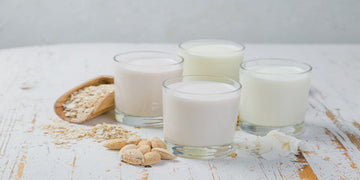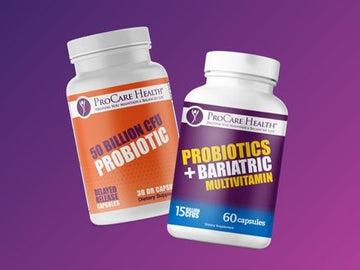
Nowadays, many people turn to milk alternatives for cereal, coffee, and cooking. There are several reasons why someone may decide to use milk alternatives.
Those include:

- Lactose intolerance – can be a rare side effect of weight loss/bariatric surgery
- Cow’s milk allergy
- Health benefits of milk alternatives
- The beneficial environmental impact of choosing to consume milk alternatives
- Calorie concern
But what is the best milk alternative? Keep reading to find out!
Cow’s Milk Nutritional Profile
Because milk and milk alternatives each have a unique nutritional profile, it’s essential to include cow’s milk nutritional profile to know what you’re comparing these milk alternatives to.
One cup of whole cow’s milk (3.25% fat) contains:
- 152 calories
- 88% water (219.12 g)
- 14 g of protein
- 12 g of carbohydrates
- 12 g of sugars
- 0 g of fiber
- 8 g of fat
- It may be fortified with vitamin D (about 12% of the daily recommended value)
Cow’s milk also tends to be high in vitamin B-12, riboflavin (vitamin B-2), and phosphorus.
In the United States, manufacturers sell cow’s milk with three different fat contents.
- Whole milk – 3.25% fat
- Reduced-fat milk – 2% fat
- Low-fat milk – 1% fat
Typically, your digestive system breaks down the lactose from the cow’s milk into glucose and galactose, which are absorbed into your bloodstream. However, in about 75% of the world’s population, the body does not absorb some or most of the lactose. This unabsorbed lactose makes its way through the digestive tract until it reaches the colon. The resulting condition is lactose intolerance.
Once in the colon, bacteria ferment the lactose, creating short-chain fatty acids (SCFAs) and gas, like methane and carbon dioxide. This causes many people unpleasant symptoms, such as gas, abdominal cramps, bloating, nausea, vomiting, and diarrhea.
Many children (and some adults) also suffer from milk allergies. Whey proteins called alpha-lactoglobulin and beta-lactoglobulin (and sometimes casein) cause allergic symptoms. The main symptoms include breathing problems, skin rash, diarrhea, bloody stools, and vomiting.
What Are Milk Alternatives?
Milk alternatives mimic cow’s milk without containing any lactose or other properties that may cause allergic reactions.
Milk alternatives come in many different forms. These include:
- Cereal-based – oat milk, rice milk, corn milk, spelt milk
- Legume-based – soy milk, peanut milk, lupin milk, cowpea milk
- Nut-based – almond milk, coconut milk, hazelnut milk, pistachio milk, walnut milk
- Seed-based – sesame milk, flax milk, hemp milk, sunflower milk
- Pseudo-cereal-based – quinoa milk, teff milk, amaranth milk
We’ll focus on the most popular milk alternatives, such as oat, soy, coconut, almond, rice, and hemp milk, and how they compare to cow’s milk. By the end of this blog, you’ll be able to decide which milk alternative is best for you!
Soy Milk
Many cultures have used soy milk as a dietary staple for centuries. Today, manufacturing techniques closely resemble ancient techniques.
Soy milk is available in sweetened, unsweetened, flavored (vanilla and chocolate), and unflavored. There are also options for full-fat and low-fat varieties.
To help mimic the nutritional profile of cow’s milk, manufacturers often fortify soy milk with calcium, vitamins A and D, and riboflavin. Soy milk already contains a similar amount of protein per cup compared to cow’s milk, at 6.34 grams. It is also cholesterol free and is great for cooking.
One cup of plain soy milk contains:
- 105 calories
- 12 g of carbohydrates (8.91 g of sugar)
- 34 g of protein
- 59 g of fat
- 68 mcg of vitamin D
- 300 mg of calcium
- 07 mcg of vitamin B-12
- 298 mg of potassium
- 0 mg of cholesterol
- .488 g of fiber
This nutritional profile will change by brand and if the soy milk is sweetened or flavored.
Soy milk also contains isoflavones (natural antioxidants). A 2014 article suggested that consuming at least 10 mg of isoflavones per day had links to a 25% decrease in breast cancer recurrence. One serving of soy milk typically contains about 25 mg of isoflavones.
Consuming soy milk may also be beneficial for menopausal and post-menopausal women. Soy provides compounds called phytoestrogens, which may mimic the activity of estrogen in the body and help relieve symptoms of menopause without significant side effects.
Coconut Milk
Coconut milk is the milk alternative with a consistency most closely resembling whole milk.
Coconut milk is naturally soy and gluten-free, making it ideal for people with multiple food allergies (except nut allergies). Keep in mind that it’s crucial to check every milk alternative product for the facility it was made in to ensure there is no cross-contamination with other allergens.
Coconut is perfect for cereal, oatmeal, and baked goods because of its nutty flavor and creamy consistency.
One cup of raw, canned coconut milk (usually used for baking/cooking) contains:
- 445 calories
- 71 g of water
- 57 g of protein
- 21 g of fat
- 35 g of carbohydrates
- 41 mg of calcium
- 497 mg of potassium
- 104 mg of magnesium
- 46 mg of iron
- 30 mg of vitamin C
One cup of coconut milk beverage (usually used for drinking and in cereal and oatmeal) contains:
- 74 calories
- 97 g of water
- .50 of protein
- 99 g of fat
- 01 g of carbohydrates
- 451 mg of calcium
- 46 mg of potassium
Manufacturers will also often fortify coconut milk beverages with vitamins A, B-12, and D2. Always check the label for added sugar, preservatives, and artificial thickeners (i.e., gums), as these can change the nutritional profile.
Coconut milk has many health benefits.
For instance, it contains medium-chain triglycerides (MCTs), which researchers have linked to weight loss in several ways:
- Balanced gut microbiota – researchers believe that a lack of stability within the gut microbiota may play a role in developing obesity. Studies suggest that MCTs may balance unstable gut microbiota.
- Reduced food intake – a 2015 study on overweight men discovered that consuming MCTs at breakfast caused reduced food intake later in the day.
- Increased insulin sensitivity – a 2019 study suggests that MCTs increase insulin sensitivity. Many researchers believe this sensitivity promotes weight loss. Insulin is a vital hormone that breaks down glucose and controls blood sugar levels.
Coconut milk may also boost your immune system. It contains a lipid called lauric acid, which researchers believe supports the immune system.
Some research even indicates that lauric acid contains antimicrobial and anti-inflammatory qualities. In one 2017 study, researchers found that lauric acid significantly inhibited the growth of Staphylococcus aureus (staph), Streptococcus pneumoniae (pneumococcal disease), and Mycobacterium tuberculosis (tuberculosis or TB).
Other researchers found the lipid to trigger cell death (apoptosis) in breast and endometrial cancer cells.
Almond Milk
Manufacturers typically make plain almond milk from ground almonds and water. However, they may also add other ingredients, like thickeners, preservatives, and flavorings, to improve flavor, texture, and shelf life.
Almond milk is naturally dairy-free, making it suitable for vegans and those with milk allergies or lactose intolerance.
One cup of regular, unsweetened almond milk typically contains:
- 39 calories
- 3 g of fat
- 1 g of protein
- 5 g of carbohydrates
- 2 g of sugar
- 5 g of fiber
It also contains a large amount of vitamin E. Vitamin E is a fat-soluble antioxidant that helps protect your body from free radical damage. It also promotes healthy skin and eyes.
Almond milk is also naturally low in sugar (avoid brands that add sweeteners/sugar), making it a lot easier for you to manage your weight and limit your risk of chronic diseases.
Oat Milk
Oat milk is naturally free of dairy, lactose, soy, and nuts, making it an excellent option for those with allergies. Manufacturers typically fortify oat milk with extra calcium, vitamin D, vitamin A, and riboflavin to mimic the nutritional benefits of cow’s milk.
One cup of oat milk contains:
- 130 calories
- 15 g of carbohydrates
- 5 g of fat
- 0 g of saturated fat
- 2 g of fiber
- 4 g of protein
- 35% of your daily recommended calcium
- 25% of your daily recommended vitamin D
- 10% of your daily recommended iron
Check store-bought oat milk for sweeteners, preservatives, thickeners, and emulsifiers, as they could harm your digestive health.
Oat milk also tends to have more protein than other milk alternatives, ranging between three and five grams per cup. It also contains a significant amount of fiber compared to other milk alternatives. However, it does have more carbohydrates and calories.
Despite being high in carbohydrates and calories, oats contain many dietary fibers, phytochemicals, and a high nutritional value. Research even proves that oat milk beverages have cholesterol-lowering properties.
The fiber-rich oats and their higher levels of carbohydrates also promote satiety and translate into lasting energy throughout the day, unlike almond and other nut milk alternatives that provide energy through fats.
Rice Milk
Often free from gluten, soy, dairy, and nuts, rice milk is suitable for those with food sensitivities and allergies. If you have an allergy, always check the food label before consuming the product!
Rice milk consists of boiled rice, brown rice syrup, and brown rice starch. It is high in carbohydrates and low in protein compared to dairy milk. The number of calories per serving will depend on whether the manufacturers have added sweeteners.
One cup of plain rice milk contains:
- 115 calories
- 37 g of fat
- 4 g of carbohydrates
- 68 g of protein
- 288 mg of calcium
- 8 mg of magnesium
- 9 mg of potassium
- 154 mcg of vitamin A
- 44 mcg of vitamin D2 and D3
- 0 mg of cholesterol
Unlike cow’s milk, rice milk contains no saturated fat. Make sure you read the food label to ensure you’re getting all the nutrients you need, such as calcium, vitamin D, and vitamin B-12.
Calcium-fortified rice milk is vital for bone health and strength and may help prevent osteoporosis. Most people don’t receive an adequate amount of calcium from their diet.
Since the body requires vitamin D to absorb calcium, the level of this vitamin in fortified rice milk is also essential for bone health.
Fortified rice milk can also help prevent vitamin B-12 deficiency. The body requires vitamin B-12 for:
- The development, myelination, and function of the central nervous system
- Healthy red blood cell formation
- DNA synthesis
Older adults, vegans, vegetarians, people who have had gastrointestinal surgery (e.g., bariatric patients), and those with digestive disorders may need to take a vitamin B-12 supplement or look for foods and beverages fortified with it.
Hemp Milk
Hemp milk is made by blending hemp seeds with water. Commercially produced hemp milk may contain other ingredients like vanilla or other flavorings and sweeteners. It may also be fortified with specific vitamins and minerals.
It resembles cow’s milk in consistency and texture but has a nuttier flavor.
One cup of plain hemp milk contains:
- 60 calories
- 5 g of fat
- 110 mg of sodium
- 0 g of carbohydrates
- 0 g of fiber
- 0 g of sugar
- 3 g of protein
- 283 mg of calcium
- 317 mg of phosphorous
- 101 mg of potassium
As mentioned, calcium-fortified milk alternatives are beneficial for bone health and strength, but calcium is also vital for several other functions within the body. It helps maintain healthy blood vessels and is crucial in releasing certain hormones and enzymes. Calcium also facilitates communication between muscles and nerves
What’s The Best Milk Alternative?
We’ve more than covered the basics of milk alternatives and how they compare to cow’s milk. Ultimately, if you’re looking for an alternative to cow’s milk, you must ask these questions:
- Which nutrients am I looking to get out of my milk alternative?
- Is my milk alternative sweetened or flavored?
- Does my milk alternative have added vitamins and minerals?
- Does my milk alternative suit my dietary needs (i.e., allergen, vegan, or vegetarian friendly)?
- What type of preservatives do the manufacturers use in my milk alternative?
- How many calories can I consume from my milk alternative to maintain a healthy diet?
- Am I getting enough protein from my milk alternative? Do I need to supplement with more protein?
Most importantly, you must enjoy it. Food is fuel and a vital part of keeping us healthy and happy.
It’s also worth noting that while milk and milk alternatives do provide nutrients, it’s still recommended by the ASMBS that bariatric patients take calcium supplements after surgery to ensure they are receiving enough to stay healthy.
ProCare Health
Visit our website at https://procarenow.com/ for more information about nutrition and what choices you should be making as a bariatric patient. You must make the correct nutritional choices. Without the proper nutrients, you put yourself at risk of chronic diseases and other issues that can negatively impact your life.
If you choose to drink a milk alternative, consider supplementing it with our ProCare Health | Whey Isolate Protein Powder. Whey is naturally easier to digest than lactose. We also include a digestive enzyme blend to aid in digestion.
Don’t forget to look at our other products and resources! We provide bariatric multivitamins, calcium supplements, information-forward blogs, monthly FREE support groups, and more to ensure that our clientele is well informed and supported during its weight loss journey.










